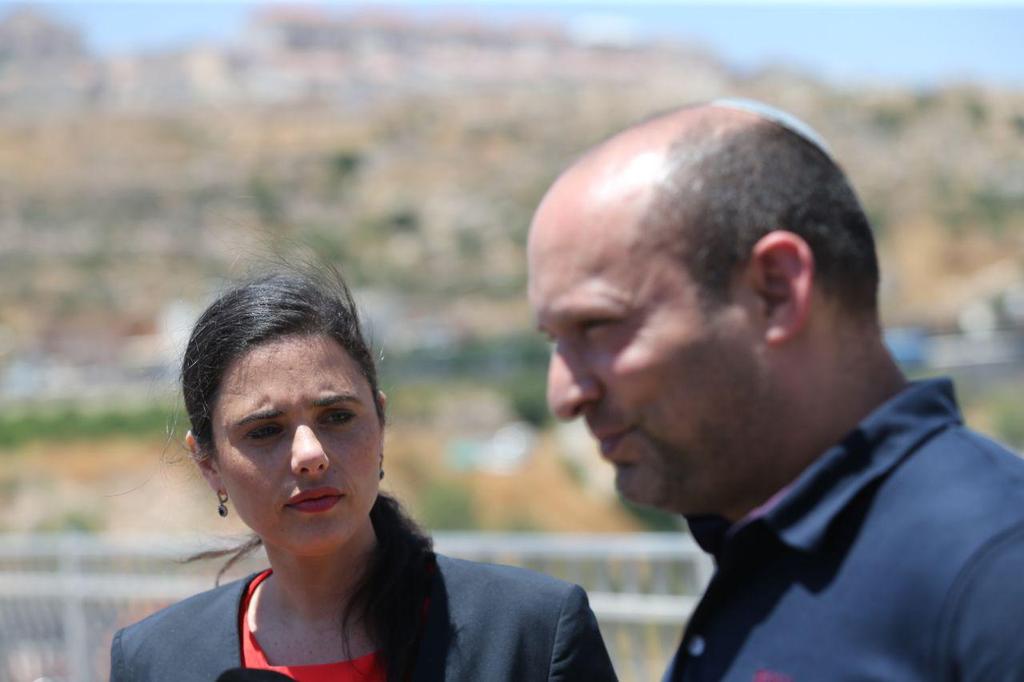Getting your Trinity Audio player ready...
Most politicians think they know it all - they are plagued with rigid thinking, they have no intellectual curiosity, no openness and are afraid of change.
But in this dreary political environment, Naftali Bennett always stood out in a good way.
He was willing to open up to new ideas and dared to go against the current.
While there is a big gap between Bennett's political vision and what I think is right for the State of Israel, unlike the others, he was never afraid to step out of his comfort zone.
During his tenure as education minister, some accused him of religionizing the education system. Personally, I find that baffling because out of all the representatives of the religious parties over the years, from declaration of independence signatory Haim-Moshe Shapira to current Education Minister Rafi Peretz, there wasn't anyone less preachy than Bennett.
But he has changed. Perhaps it’s the trauma of his party's searing failure to reach the electoral threshold in the first round of elections; perhaps it's the gap between what he thinks about Prime Minister Benjamin Netanyahu's rule and what he must say publicly; or perhaps it's just his political environment.
Bennett, much like fellow New Right leader Ayelet Shaked, is a Likudnik who was cast away by Likud. That's his natural home.
4 View gallery


Naftali Bennett and Ayelet Shaked: Likudniks without the Likud
(Photo: Alex Kolomoisky)
Among the kooky and messianic company that has taken over the religious-Zionist parties, Bennett will always stick out like a sore thumb.
From time to time, they will test his loyalty: Either you dip your hands in the filth of Jewish terror like us or be declared a traitor.
Throughout his career, Bennett has always aspired to become defense minister. He believed this was his calling, that he could breathe new life into the IDF, bring a spirit of victory and leadership that the Israeli public misses so much, smite Hamas and Hezbollah and pave his way to becoming prime minister.
But he is not the first to discover how different things look from the defense minister's chair.
Every defense minister who is not the prime minister is the prime minister's enemy. He is being crushed between two figures much more powerful than he is – the chief of staff and the military on one side and the prime minister and his people on the other.
4 View gallery


Prime Minister Benjamin Netanyahu, Defense Minister Naftali Bennett and IDF Chief of Staff Aviv Kochavi
(Photo: Ministry of Defense)
The defense minister is not much more than an island in a sea of traffic. His authority is undermined left and right, while the settlers in the West Bank keep pressuring him to provide them with more construction permits and more funding.
This certainly wasn't the glory Bennett dreamed of.
Now add Jewish terror to this already perplexing reality.
Alleged Jewish terrorist Eliya Ben David has managed to build himself a hefty criminal record in the Shin Bet security service, which was in court unable to prove anything without exposing sensitive intelligence sources and bury other investigations.
For this purpose, a very legally problematic patent was invented, one that severely infringes on the suspect's rights but is indispensable in times of terror – the administrative detention, which lets the state arrest and detain without trial individuals suspected of terrorism.
According to the law, the defense minister is the one who signs the arrest warrant. The Shin Bet passed the suspect's name to the defense minister's office, and Bennett signed it.
And then came the political pressure: "The guy has friends, family and rabbis," and "he is one of ours."
Itamar Ben-Gvir of the extremist Otzma Yehudit (Jewish Power) party threatened a campaign for the release of Ben David, vowing to flood social media and take Bennett's far-right voters. Transportation Minister Bezalel Smotrich, the mouthpiece for Jewish fundamentalism, then joined the party as well.
A terrified Bennett capitulated and canceled the warrant.
"I will not be a rubber stamp for you or the Shin Bet," Bennett later declared gleefully in an interview with Israeli TV.
True, he wasn't a rubber stamp but a rubber band. Twisting and turning between signing the arrest warrant and canceling it and between his duties as defense minister and his fear of losing voters before the March 2 elections.
It's easy to surmise what would have happened had Bennett been the one to decide whether to approve a Shin Bet request for special measures against Jewish terrorist Amiram Ben-Uliel, who set a Palestinian family home ablaze in 2015, killing mother, father and 18-month-old baby.
A scenario in which this murderer still roams free to this day is not so far-fetched.
Bennett's decision about Eliya Ben David passes the wrong message to Jewish fundamentalists.
The Shin Bet is not perfect. The Israeli media has been exposing the agency's misdeeds long before Bennett ever got involved in politics.
Even today, every decision the Shin Bet makes must be examined and considered carefully. It's completely legitimate to refuse to sign an arrest warrant, but the motive behind this refusal cries foul to the heavens.
We've already grown accustomed to attributing so many things to Netanyahu's war of survival in his legal plight, but that's only a part of the whole picture.
But Bennett challenges all the gatekeepers – from the courts to the attorney general, the state prosecutor, the police, the army, the Shin Bet, the state comptroller and the media.
This is not gaslighting; this is an attempted coup.



